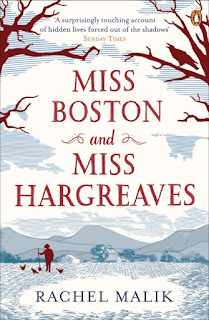Winners and almost winners. Ali Bacon compares porcelain with clay and other gutsy stuff in this year’s Sir Walter Scott Prize
As a (new) writer of historical fiction I’ve taken a
particular interest in this year’s Sir Walter Scott Prize and set myself the task of
reading the shortlist. I
haven’t quite got to the end, but knowing the winner is Ben Myers with The Gallows Pole, here are a few
thoughts after four (out of six) very different reads.
I came across Jane Harris’ Sugar Money soon after a trip to
the Caribbean so was particularly interested in this 18th century Grenadan
adventure story, then progressed to the newly announced winner (a very
different 18th Century Yorkshire) before I got to Rachel Malik’s Miss Boston
and Miss Hargreaves and most recently Manhattan Beach, by Jennifer Egan. As it
happens the second two are both 20th Century so it seems reasonable to pair
them by period.
Despite differences of geography and style, there are similarities between the two ‘earlier’ titles (and they get a slightly longer review in this blog post) Both use a form of vernacular for at least some of the narrative and I preferred the creole patois (a fascinating linguistic confection to which I assimilated surprisingly quickly), to the more prosaic transcription of
I’ve just discovered that although this is told as straight fiction, the book is based on the author’s family history and this is her attempt to weave known facts into a narrative. This may explain why a lot of what may have happened between these women is left unsaid.
I liked it very much but perhaps its quietude and oblique approach worked against it in the final analysis.
So I still have two to read; Grace by Paul Lynch and The Wardrobe Mistress by Patrick McGrath. But it seems to me that even within one genre there is such diversity that deciding on the winner must be horrendously difficult.
Here’s part of the judges' statement.
‘Judging this prize is always tough, and our 2018 shortlist was such a cornucopia of different styles, themes and historical episodes that we had our first ever hung jury and secret ballot. …. In the end, our final choice was between delicate porcelain and earthy clay, and clay triumphed."
Ali Bacon's historical novel In the Blink of an Eye is set in Victorian Edinburgh. A fictional biography of artist and photographer David Octavius Hill, it tells his story through the eyes of those who knew or sat for him and has been described by reviewers as 'elegant and fascinating' and 'beautiful, accomplished and profoundly moving'.
Available in ebook or paperback from Linen Press.






Comments
I'm never quite sure how to describe mine, but Karla Brading's The Inn of Waving Shadows could be 'dark chocolate eyeball'... in a Trick and Treat bag, naturally.